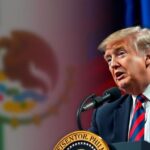Politics
” GOOLSBEE, AARON MOTSOALE, AARON MOTSOALEDI, AFRICA, ASIA, AUS, AUSTAN GOOLSBEE, BOSTIC, CANADA, CHINA, COLLINS, DONALD TRUMP, ECONOMICS, EL, ELON MUSK, EUROPEAN UNION, FEDERAL RESERVE BANK OF ATLANTA, GOOLSBEE, INFLATION, JOHANNESBURG, MARCO RUBIO, MARKETPLACE RADIO, MEXICO, MUSK, NATIONAL SECURITY, NORTH AMERICA, PETERSON INSTITUTE FOR INTERNATIONAL ECONOMICS, PHILIPPINES, RAPHAEL BOSTIC, SOUTH AFRICA, SUSAN COLLINS, TARIFFS, TRUMP, URSULA VON DER LEYEN, US, USAID
Sophia Klein
Trump Pauses Tariffs on Mexico and Canada Amid Trade Concerns and Inflation Risks
President Trump has paused tariffs on Mexico and Canada as European leaders express concerns over U.S. trade policy. Federal Reserve officials warn about inflation risks stemming from potential tariffs. Aid freezes have raised issues for HIV/AIDS programs in South Africa, while legal challenges in the U.S. question federal spending freezes. Cooperation in the region to curb illegal migration has emerged as a focal point of U.S. diplomacy.
In light of escalating trade tensions, President Donald Trump has announced a temporary pause on tariffs imposed on goods from Mexico and Canada. This decision coincides with dialogues among European Union leaders regarding the potential impacts of such tariffs. EU officials, led by President Ursula von der Leyen, have expressed a desire for constructive dialogue while noting their readiness to respond to any unfair trade practices from the U.S.
Federal Reserve officials have raised concerns over the inflation risks associated with broad-based tariffs. Susan Collins, President of the Federal Reserve Bank of Boston, indicated that such tariffs are likely to affect the prices of both final and intermediate goods. Similarly, Austan Goolsbee from the Chicago Fed emphasized the need for caution in interest-rate cuts amid tariff-related uncertainties.
The prospect of extensive tariffs affecting imports from China, Mexico, and Canada has staggering implications, with analysts estimating that the average American household could incur additional costs of $1,200 per year. Meanwhile, South Africa is experiencing turmoil over a recent U.S. freeze on aid, with Health Minister Aaron Motsoaledi questioning the impact on vital HIV/AIDS programs.
U.S. Judge Loren L. AliKhan has temporarily halted the plan to freeze federal spending, stating that many nonprofit organizations continue to face potentially catastrophic consequences from the funding freeze. As different states pursue legal avenues to challenge the freeze, there have been notable delays in the disbursement of crucial federal funds supporting various programs.
Despite these challenges, the border security efforts in Canada demonstrate an unexpected outcome of Trump’s tariff threats, as Canada refocuses its resources to enhance border security without imposing tariffs for the time being. The Prime Minister’s commitments appear satisfactory to the U.S. administration, allowing for negotiations without the immediate threat of trade restrictions.
In Panama, U.S. Secretary of State Marco Rubio concluded his visit by overseeing deportations while underscoring cooperative initiatives to curb illegal migration. He highlighted the importance of partnerships with regional allies to mitigate trafficking issues, despite concerns regarding Chinese influence over the Panama Canal. The ongoing coverage of trade discussions and policy impacts remains critical to understanding these geopolitical shifts.
The article addresses the recent developments surrounding President Trump’s tariffs on Mexico and Canada, focusing on the implications for U.S.-EU relations, inflation risks, and humanitarian aid programs. It illustrates the responses from various officials including Federal Reserve members and foreign leaders, highlighting the interconnectedness of trade policy and international cooperation. The legal challenges regarding federal spending and the ongoing border security efforts provide insight into the broader impact of Trump’s policy decisions.
In conclusion, the pause on tariffs from Mexico and Canada reflects an opening for dialogue while raising critical concerns over inflation and international relations. The Federal Reserve’s cautious approach to interest rates amidst tariff uncertainties and the challenges faced by humanitarian aid in South Africa underscore the complexities at play. As regional partners collaborate to address migration issues, the broader implications of trade policy continue to evolve, influencing both domestic and international landscapes.
Original Source: www.aljazeera.com








Post Comment